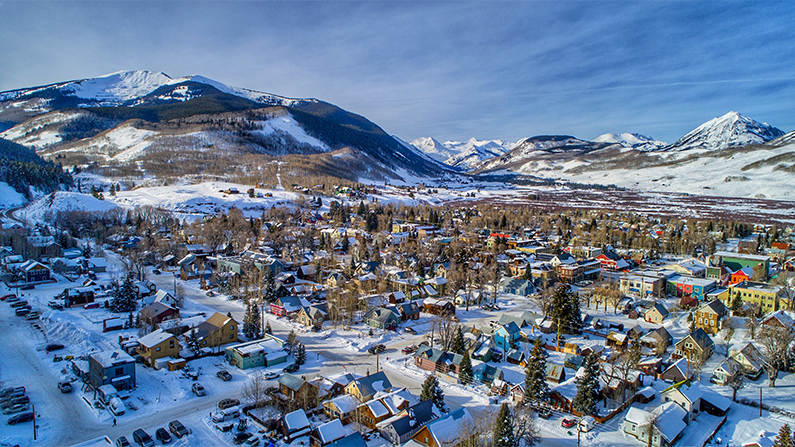On June 7, the Town of Crested Butte declared a local disaster emergency in response to the affordable housing crisis. It was the first of its kind among mountain communities in the West, where housing shortages continue to put stress on local workforces. Declaring a housing emergency allowed for a creative housing solution.
“The Ruby is a former bed-and-breakfast. It’s a six-unit bed-and-breakfast, with actually really nice rooms: queen size beds with their own private bathrooms, but they have a shared kitchen. That shared kitchen convinced us that this would be perfect for a seasonal housing program.”
Troy Russ, Crested Butte’s community development director, says the town looked into purchasing The Ruby prior to declaring an emergency order, but they quickly realized local zoning regulations would make it a challenge.
“Right now, this is in the tourist zone district, the congregate housing wasn’t allowed at the time. So, we wanted to get this thing going,” Russ says. “The emergency order allowed us to work with the housing authority to start occupying it. The town will now clean up the zoning and go formally through our board of zoning and architecture approval this spring to get it formally occupied.”
Willa Williford is a workforce and affordable housing consultant based in Crested Butte. She’s worked in rural and resort communities across the mountain west for about six years. Over the past year, Williford has seen a surge in hotel conversions.
“One of the things I love about these motel conversions is that you can effectuate them quickly, they’re environmentally conscious, you’re just repurposing an asset that already exists, and with how expensive labor and construction materials are, and everything it takes to get something new built, this is a really elegant solution,” she says.
While Williford commends the idea, she also sees zoning as the one of the biggest roadblocks.
“These motels exist in zones that work commercial or intended for tourism and so when they are switching to long term rentals, the underlying zone may not allow that, so we just need to be thoughtful about how we can be more flexible about zoning? Do we really need everything to be zoned to prohibit residential use?”
Hotel conversions can also be costly if buildings need extensive renovations. In those cases, Williford says it’s hard to keep rental prices affordable.
Cities and counties aren’t the only entities purchasing hotels to convert into housing. In Bozeman, Montana, Brian Guyer is the housing director for the Human Resource Development Council, a nonprofit that provides a variety of assistance programs to people living in Southwest Montana. Guyer says the housing outlook is dire to say the least, and HRDC realized they needed to do something different in response to the post pandemic housing issues.
“In one of the ways that we did respond– we bought a hotel!” Guyer says.
To comply with city codes, HRDC did not put the hotel to its intended use right away, but it still benefited those in need of housing last year.
“In the short term, it operated as a hotel with little to no fees. For the first year it was very useful for housing our over 65 and medically vulnerable population.”
Crested Butte is just one of the many mountain communities thinking outside the box when it comes to housing. The town of Eagle converted a hotel to micro apartments in 2018. In June, Summit County signed a one-year lease with a Frisco hotel that will house workers this winter. And the Steamboat Springs City Council and Planning Commission just approved two separate hotel projects that will serve as temporary workforce housing.
Russ admits that dormitory-style living is not for everyone. Residents of The Ruby are required to agree to basic rules, such as no overnight guests and no drugs, no super-bowl-like parties in the living room — and some people see these rules as inconvenient. It’s also a drop in the bucket — providing six bedrooms compared to the hundreds that are needed.
Yet, Russ sees The Ruby as one solution to the housing crisis that, more than ever, requires a quiver of solutions.
“We just recognize that building your way out of it is not the only way to address it. Fortunately this bed-and-breakfast came online, we had the resources to buy it, and maybe it will provide housing without adding impact on our community,” he says.
Seasonal restaurant workers started moving into The Ruby on Aug. 1, and as of mid-October, the seven rooms were fully occupied for the winter season.
This story is part of a reporting project between the Solutions Journalism Network and Rocky Mountain Community Radio highlighting affordable housing solutions across the Mountain West.






